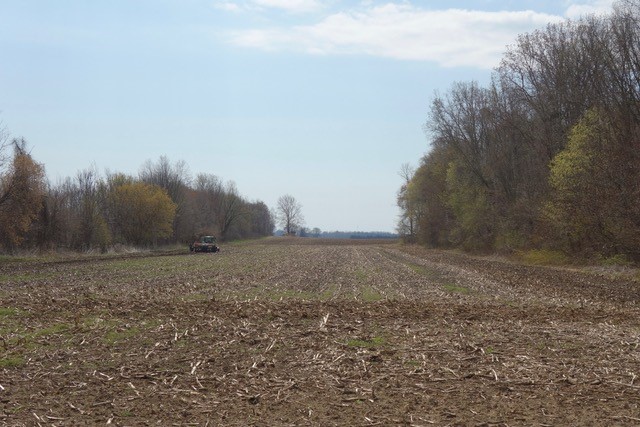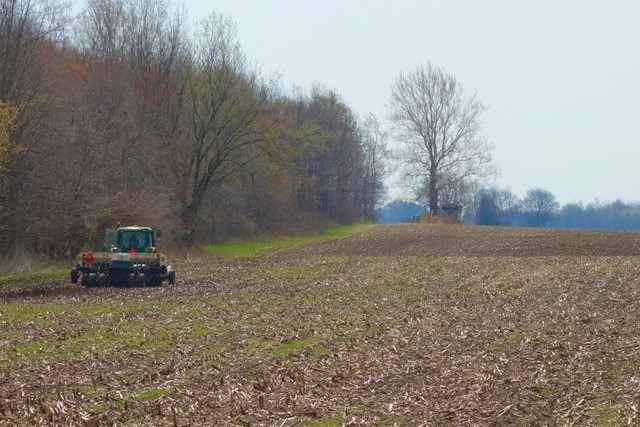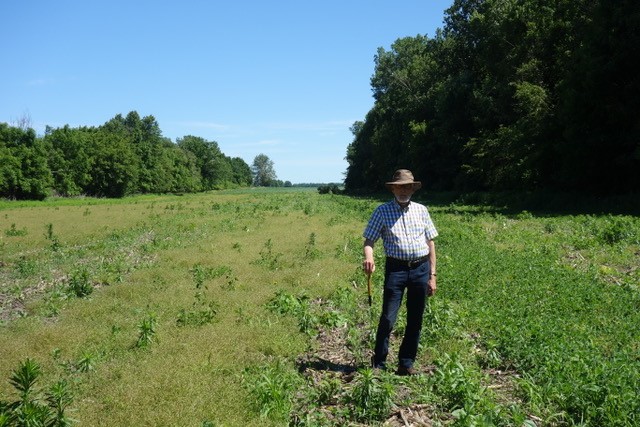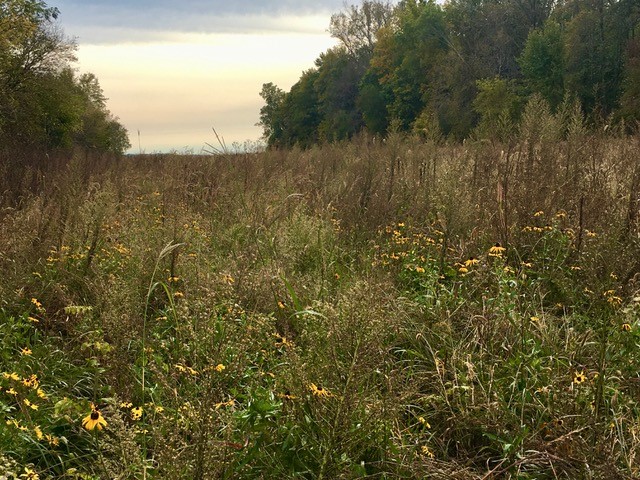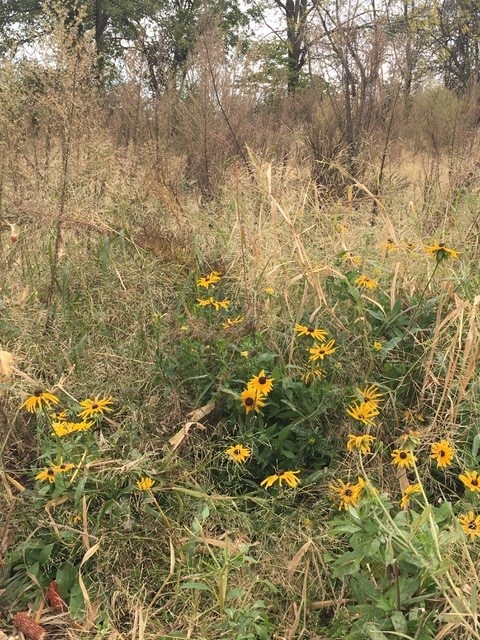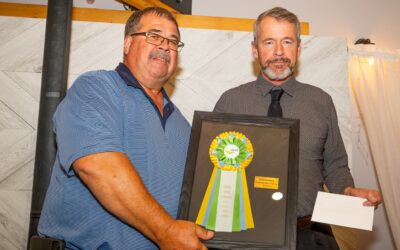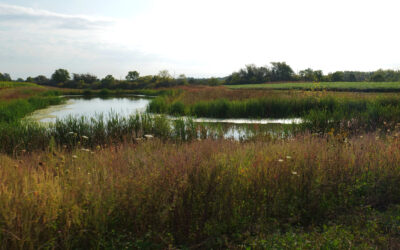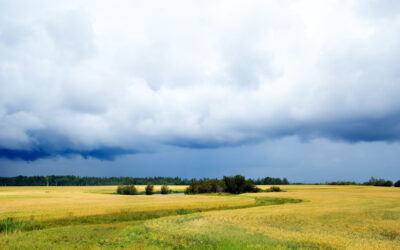ALUS Chatham-Kent participants, Betty and Allan Hubbell, want their grandchildren to know a world rich in biodiversity
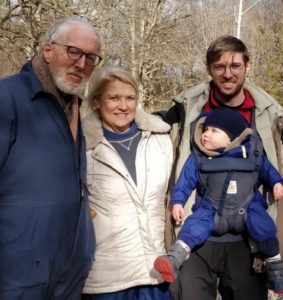
Allan and Betty Hubbell (far left and middle) with their son (right) and grandson.
Lifelong residents of Chatham-Kent, Betty and Allan have a close relationship to the land.
“This land was farmed by my dad since the 1950s, and we purchased this piece of property from his estate in 2021,” says Betty. That piece of property added 48 acres to an adjacent 22 acres that Betty and Allan already owned, making 70 acres total, which is home to a 4 acre ALUS grassland project, as well as 13 acres of mixed hardwood forest.
Betty and Allan’s connection to the land goes back much further than Betty’s dad, though. Allan’s great, great, great — in fact, let’s say exceptionally great—grandfather, Prindle Hubbell, established a homestead in the 1790s, which was a short distance from where their ALUS project now resides.
This long connection to the land plays a role in the Hubbells’ keen awareness of the land’s health and well-being. When Betty’s father cultivated the land, he looked to the best management practices of the time to get the most from his land, instituting minimum tillage to preserve soil quality.
“He was always interested in preserving the quality of the property, of the soil,” says Betty. “Dad had respect for the land and his livestock, and he always farmed with care.”
And that ethos was passed along to her.
“We both have an interest in the environment and caring for the environment,” says Betty of herself and Allan.
Their shared interest led them to establish a managed forest agreement project on a second property they own, a woodlot north of Thamesville. They then established a tallgrass prairie project on that same property, and through that they found their way to ALUS Chatham-Kent.
The Hubbells decided to take a parcel of their 70 acres out of production and establish it as tallgrass prairie to improve biodiversity. To do this, they turned to Greg Van Every at the Lower Thames Valley Conservation Authority who brought the ALUS program forward as a solution.
“We found the application and approval process was made easy by the knowledgeable staff at the Lower Thames Valley Conservation Authority and the ALUS contacts that they provided, as well,” says Allan. “So, there wasn’t a complicated, time consuming, stressful process. It was very simple and straightforward.”
Between the hardwood forest and the tallgrass prairie, a dynamic ecosystem rich in biodiversity can flourish, as each contributes to the health of the other, housing different species and providing some species access to different environments they need to thrive.
The Hubbells’ desire to improve biodiversity makes sense. They’ve lived in the area their whole lives and have seen significant changes.
On the woodlot north of Thamesville, the village where he grew up, Allan was immersed in nature from childhood.
“I have noticed over the course of my lifetime the disappearance of certain species that in my childhood I frequently came across, and now I never come across,” says Allan. He notes species like the eastern foxsnake (pantherophis gloydi) and eastern hog-nosed snake (heterodon platirhinos). “I used to gather morels as a child, every season, never find them now.”
The changes are not just in the species, but in how the land and the weather interact.
“We saw an exceptionally rainy year in 2021, and at our forest property we’ve seen an amount of water, standing water in the forest, that’s exceptional,” says Allan. “I’ve never seen so much water standing in the woods.”
Luckily, the excess of standing water hasn’t created any problems on their property. It’s hard to predict what the outcome of increased rainfall and standing water will be on their property over time, but with tallgrass prairie and hardwood, they are lucky to have a developed root system that helps control and capture surface water and groundwater.
“We know from what we read about climate change that rising temperature allowed the retention of more moisture in the air, which is then released as rainfall,” says Allan. “So heavier rainfall may be something that’s with us for many years to come.”
Not that there aren’t challenges in managing their tallgrass prairie project, as Betty explains.
“One of our biggest challenges would be the control of invasive weeds,” says Betty. “There’s a fair bit of fleabane, horseweed, that came up. Of course, it was chopped in the fall, but we expect to see it again in the spring.”
There are many benefits of partnering with ALUS on a tallgrass project, one being that the landowner is compensated for their efforts to manage the project. Diligent removal of the fleabane season after season should see the native species outcompete the invasive in the long term, something the Hubbells are working towards.
With an eye to the future, the Hubbells are committed to growing the resilience of their land to improve its health in the long-term; the future is important to Betty and Allan.
“We have one young grandson, now 18 months old. And the second grandson on the way is due to arrive this spring,” says Allan. “We hope this project plays a small part in building our sustainable future for a better environment as they grow towards adulthood.”
“We would like to preserve both of the woodlots and the tallgrass areas on both of our properties, indefinitely,” says Betty.
All images courtesy Betty and Allan Hubbell.

